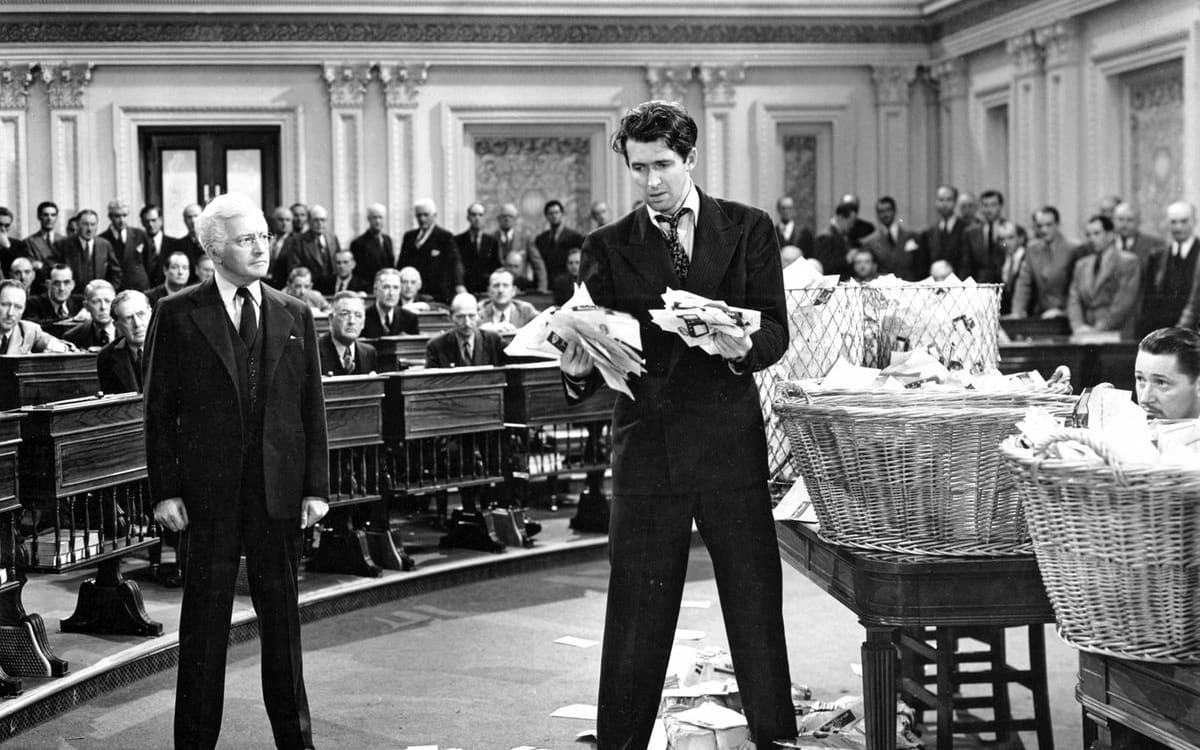Mr. Smith Goes to Washington by Frank Capra (Review)

I’m not really sure why I ended up renting this movie. I think Jimmy Stewart was a tremendous actor, and you can’t go wrong with Frank It’s A Wonderful Life Capra. But maybe it’s because, in this day and age where politicians are, at best, considered deceitful and manipulative, and concepts like “patriotism” are often met with sarcasm and cynicism, I wanted to see a film that is unashamedly pro-American. Not in a “Let’s go bomb the hell out another nation and the United Nations be damned” sort of way, but in a “Maybe there is something great about this ‘Life, Liberty, and The Pursuit of Happiness’ stuff after all” sort of way.
When one of the state’s senators unexpectedly dies, the movers and shakers try to find a replacement, and they select the unlikeliest of fellows: Jefferson Smith, a “gee shucks” kind of guy who is as “Mom, baseball, and apple pie” as they come. At first, they think the guy, who goes completely starry-eyed the minute he sees the Capitol dome, will be easy to manipulate. But Smith, who has this damnable integrity and conviction about him, threatens to blow the lid on their shady political machinations.
Of course, being the corrupt, money-grubbing bastards they are, they place him to be the fall guy. Smith refuses to go quietly however, which leads to the most famous filibuster in cinema history as he rails against big money and political corruption while espousing the virtues of this great Nation (e.g., reading the Constitution).
There are certainly parts of the movie that border on self-parody: the montage of Smith visiting all of the monuments and memorials as a medley of patriotic anthems plays and a giant American flag waves in the background is almost ridiculous. However, the film is just so gosh-darn sincere that it’s impossible not to get inspired by Smith’s fervor.
Stewart, looking especially fresh-faced here, is perfect as Smith, bringing a palpable sense of conviction to the role. And he can do wonders as an actor while merely fumbling with his hat or struggling with a flimsy sheaf of papers, classic stuff you just don’t see in movies anymore. On the romantic side, it doesn’t hurt that the radiant Jean Arthur plays Clarissa Lawson, Smith’s cynical, weary secretary who slowly warms up to the young senator’s idealism.
The film is unashamedly pro-American, but there are some scenes that are downright subversive. As the movers and shakers, led by business tycoon Jim Taylor, try to shoot Smith down, they go to elaborate measures; stealing pro-Smith newspapers from children, running Smith’s youth supports off the road, and turning the firehoses on pro-Smith parades (which brought to mind all sorts of disturbing imagery from the civil rights marches of the ’60s).
I’m as cynical as anyone else about our nation’s government. With everything that’s happened in the past few months — Gulf War II, the accusations that have arisen over 16 little words, the growing concern over our government’s honesty (or lack thereof), the alarming rate at which personal liberties are being sacrificed — it’s hard not to become worried and frustrated. I wonder what would happen if someone like Mr. Smith really did go to Washington, someone dumb and decent enough to honestly believe that “lookin’ out for the other fella” is and always will be the best policy, foreign or otherwise.
But that sort of thing only happens in movies, right?
